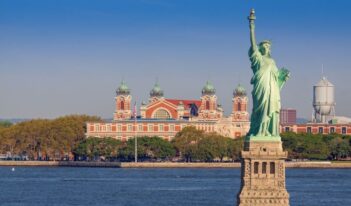
Advocates urge U.S. government to create visa system for Hongkongers seeking to escape China’s tightening grip.
On the day that the United Kingdom formally handed Hong Kong back to China, Britain’s Prince Charles made a vow to the people of Hong Kong: “We shall not forget you.” The British government’s recent policies made good on this promise.
Following the enactment of a law in China restricting Hong Kong’s autonomy, British Prime Minister Boris Johnson announced last summer that his government would offer visas to all Hongkongers seeking to escape to the United Kingdom. As of December 2020, the country’s Her Majesty’s Passport Office has issued over 200,000 British National Overseas passports, which will enable recipients to live and work in the country for five years and be eligible for full citizenship thereafter.
On the other side of the Atlantic, calls are now growing for the United States to follow Britain’s lead. Advocates urge the U.S. government to craft a specialized visa option to fast-track the immigration process for Hong Kong residents. Achievable through modifications to existing immigration regulations, such a system would not only elevate the moral standing of the United States, advocates argue, but also serve to benefit the country’s economy given the high levels of education and entrepreneurial spirit of Hongkongers.
The most basic proposal would grant a visa to any Hong Kong resident who is trying to escape political repression by China.
In December, a congressional commission that oversees national security issues related to China–United States relations made just such a recommendation in its annual report to the U.S. Congress. In that report, the commission urged Congress to direct the U.S. Citizenship and Immigration Services to “identify and remove barriers to receiving United States visas for Hong Kong residents attempting to exit Hong Kong for fear of political persecution.”
Other commentators, however, have suggested that the United States should take a more aggressive approach and seek not only to allow, but moreover to attract, immigrants from Hong Kong.
Matthew Yglesias, co-founder of Vox, has argued that the escalating situation in Hong Kong offers a perfect opportunity to implement an innovative immigration proposal known as “place-based visas.”
First conceived by researchers at the Economic Innovation Group, place-based visas, also known as “heartland visas,” offer a streamlined path to immigration for skilled immigrants willing to settle in qualifying localities facing demographic decline and shrinking workforces. In exchange for a five-year visa, recipients would be required to maintain residence in a qualifying city or county, after which the visa would convert to permanent residency.
One of the key campaign proposals of then-presidential candidate and now U.S. Department of Transportation Secretary Pete Buttigieg, place-based visas would bring new, skilled labor to areas of the country such as Buttigieg’s own South Bend, Indiana, which has been contending with a dwindling workforce for years.
The strength of place-based visas in the context of Hong Kong, as Yglesias points out, is that the average Hongkonger would come equipped with high levels of education and a strong penchant for entrepreneurship. An influx of skilled immigrants would provide an especially needed stimulus in parts of the United States where economic activity has steadily declined, Yglesias argues.
But perhaps the most ambitious proposal to attract fleeing Hong Kong residents to the United States is simply to offer green cards as of right to any and all Hongkongers who wish to immigrate.
The editorial board of The Wall Street Journal advocated this option shortly after China enacted its national security law in the summer. In its op-ed, the Journal’s board noted that granting green cards to Hong Kong residents would simultaneously bolster the labor force of the United States and deal a blow to China if thousands of Hongkongers fled the city in repudiation of the mainland.
The evidence that this latter scenario might play out in reality has only grown since the United Kingdom started issuing passports to Hong Kong residents in bulk. Facing the prospect of a mass exodus from the city, China has exhorted the United Kingdom to walk back its proposed policy of offering Hongkongers a path to citizenship, claiming that it interferes with China’s domestic affairs.
That the United Kingdom’s visa policy would have such an unnerving effect on China’s Foreign Ministry is proof to advocates such as Yglesias and the board of The Wall Street Journal that the United States should follow suit.
Such a policy would not be unprecedented in the United States. Eric Boehm likened such a move to the U.S. policy during the Cold War of welcoming in defectors from the Soviet Union.
Others might well see in it the latest manifestation of Emma Lazarus’s poem on the Statue of Liberty: “Give me your tired, your poor, your huddled masses.” And now, perhaps Hongkongers, too.



